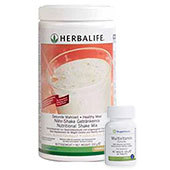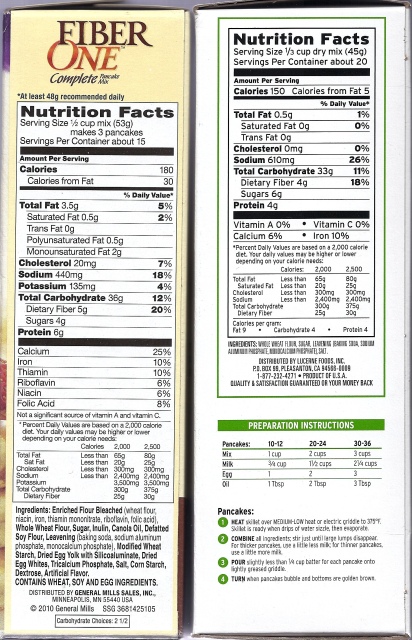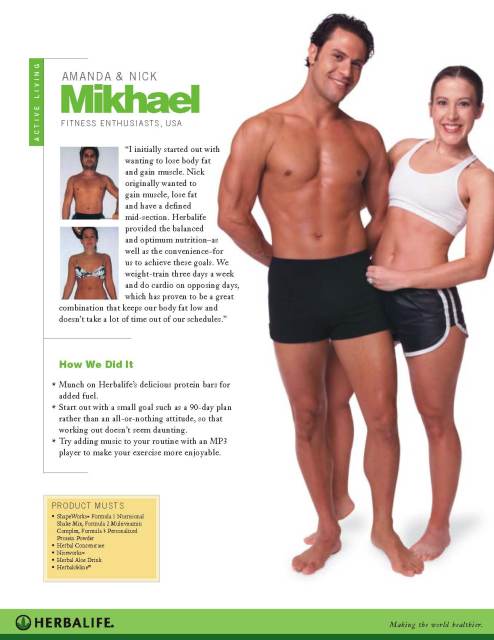Questions about Calories
Question
QUESTION: Hello Tim :)
I'm a medium framed 23 year old girl who weighs at 68 kg. I'm interested in controlling my weight after discovering that I'm technically overweight for my body (and I know it's certainly not muscle).
Well I'm keen on getting an even healthier kick to my lifestyle so I decided that it was best to start keeping track of my calorie consumption. I tried to look online to find information about determining the amount of calories I should consume if I don't workout in order to lose weight, and then how much I should consume once I reached my ideal weight and how to determine how much I should have if I workout but want to maintain my current weight (if that all makes sense?)
I've also been trying to keep score of counting calories but a lot of the info about certain produce and products are conflicting, especially since I live in Kuwait (so we don't have some things people say we should substitute for and we even have some products that have a carb count but no calorie count - though I did later find the formula for determining that). Plus I'm confused even more so about how calories can change when you cook or boil or whatever process to the food you eat; what type of formula do you use for that? How do people do this?
And when you go to restaurants too - people say just eye-ball it but how do I know exactly how many calories are in my food, even if it seems like a light and healthy option? I mean as I was watching a local tv show we have here one of the special guest speakers they brought on for their segment was nutritionist who said that even if you go to a restaurant or fast-food type of joint and you ask them about the calories in a certain meal or it's available on their menu their information is not always accurate or reliable.
It's a big confusing pool of information, so I hope you could shed some light and help me out? And anyone else who stumbles across this too :)
Thank you for your time and input!
ANSWER: Miriam, my sincere apology for the late response. Its not an excuse but some personal matters had me away from the computer.
Anyways on to your question. I find people often misunderstand calories, thus misunderstand nutrition and how to use it properly.
I'll address your concerns as you presented them.
The first thing to do is not take stuff like BMI too serious. There are way too many variables that it does not factor in before saying you're this or that.
If you're looking to lose some excess fat, (I say fat and not weight on purpose) the thing you need is a negative calorie balance. Simply put out more than you take in. A calorie is nothing more than a unit of energy. If you use less than you put in, the body stores the extra. If you put in less than you expand then the body stays at a negative energy balance. It gets extra fuel from stored calories.
Most people think they should drastically cut calories to start with. In reality you should taper them down slowly. But the best approach is to utilize more than you put in. Increase the amount you use, not that amount you put it. This is done by exercise, and activity that requires energy.
Make sense? If not tell me as I tend to ramble.
Watch the macronutrient rations. That's the protein, fat and carbs. These make up the calorie count. Protein and carbs are 4 calories per gram. Fat is 9.
At least in the U.S. regulations are pretty strong as to having food companies put accurate info on labels. But its usually never 100% accurate.
As far as calories changing when cooking, this is not really true. Cooking does not alter the macronutrient profiles thus the calories stay the same. The only thing cooking can do is add calories if you're simmering in oil or butter or reduce vitamin content in the case of boiling or exposing to heat.
Restaurants are another story. Give them credit for showing nutrition information, but never trust it. This is based on their calculations and can never be 100% accurate. In fact the same restaurant in different areas can have two of the same dish differ due to having different food suppliers. At a restaurant its more of a best guess and common sense. And unless the restaurant specializes in clean eating then assume its a risk.
And remember, healthy is a state of mind. In the U.S. McDonald's sells salads. That's great except for some of their salads can have more fats and sugars than a small burger. There is a difference between being healthy and sounding healthy. Another trick they use is with grilled chicken. It is and sounds healthy, yet they brush it with butter when cooking it to enhance taste. I'm not slamming restaurants, just saying when in doubt, cook your own food from ingredients you buy.
I hope this helped out in one way or another. If there is something you'd like me to be more specific on please write back. You have my word it will not take as long to get a response. Again my apologies.
---------- FOLLOW-UP ----------
QUESTION: Hi Tim,
Thank you so much for your response and your informative reply. I've never stumbled across the negaive calorie balance, so I should look into that.
However, what i'm wondering now is how can I determine if my weight or fat is at a healthy or at least average state? If my life is in danger, because of the content in my body or such, is there any way I can figure that out exactly?
Obesity, diabetes and cholestrol are problems that run in both sides of my family. So i'm deathly afraid. Thankfully I am not overweight or obese, and I don't have diabetes and I don't think I have cholestrol problems - but I'm worried I might be at risk, so I'd like to put a stop to that if you get what I mean?
What would be a good source of information on this? I have read from others hat adopting the South beach diet has helped their internal organs to become much healthier (as they cut off many things such as hydrogenated oils, certain unhealthy meats, etc.) but i actually would appreciate it a lot if you, the professional, could tpoint me in the direction of useful info to help me be more careful with what i consume
Am I making any sense?
My biggest fear is falling in line with what the elders in my family suffer, so i hope to adapt a very healthy lifestyle if I can.
On that note, i have another question: as I'm 23 years of age does that mean my body is no longer flexible? I am easily demotivated when i workout. It isn't for the sense of burning fat or losing weight but because I want to feel healthier and stronger physically. Ultimately, I never usually feel satisfied or proud of my efforts, so I ultimately abandon any type of exercise routine.
But hopefully with your suggestions and guidance, I can change that habit. My question thus is: what would be a good workout program for me, someone who is very out of shape/unfit, that can certainly help me build my strength and stamina?
Thanlk you again!
Hi Miriam,
I applaud your desire to try and avoid certain diseases. Most of the conditions you mentioned are easily preventable through the way you eat.
In regards to cholesterol though, one of the best diets, and let me go off subject. When I use the term diet I refer to it in the sense of the foods you eat, not as in some weight loss plan. But as I was saying, the Mediterranean way of eating is best. It focuses on whole grains, fruit, vegetables, monounsaturated oils (olive), fish and lean poultry.
But the good thing overall is you're still pretty young. So adopting healthy eating and exercise habits now will benefit you for life.
A lot of the health issues you mentioned can be in your genetics but you are 100% in control of preventing all of them.
You're right when you mention cutting out hydrogenated oils. These are the Trans fats in food that you hear so much about. Tran fat is one of the most deadly things you can eat.
Don't count on the label to tell you that a food is trans fat free. If you see the word hydrogenated in the ingredients that means its in there. The FDA says that is something is below a gram that it does not need to be disclosed on a nutrition label.
This is why the beast thing to do is to cook as much of your food as you can from whole ingredients.
Other things to avoid are processed foods and processed sugars, including high fructose corn syrup. All of this stuff is real food that has been altered by man for manufacturing purposes.
as far as your motivation to work out this can go 2 ways.
1. You have to want it. I've dealt with people that are all into getting in shape and eating right. But when it comes to it they aren't willing to put in the effort. You have to want it for you. Not because its the right thing to do, and not even because you have a family history of disease. Do it because you want to get the most out of your health.
There has to come a point where you say "fu*k it, I am doing this despite the odds"
I like to say it is better to push your self through a workout you don't want to do than to regret for hours that you didn't.
2. Your motivation too can depend on what you eat. How often you eat. How well do you sleep. Your lifestyle. All these play a factor in your motivation levels.
But why are you not seeing a reward in what you do? Look at it this way, even if you get to the gym and work out for 10 minutes, that's better than nothing. Any effort you put forward is good. But you have to customize your workouts to suit your needs.
and you have to enjoy it.
Another thing you may do is something I call finding an idol. Find someone whose level of fitness you admire. I said this to my friend and he chose Dwayne Johnson (The Rock).
Now he has no desire to be as big as Dwayne but he likes the man's drive and motivation and approach to life.
So what I tell hiom to do is use Dwayne as motivation. Never strive to be like him, but rather use him to be a better you. Tape his picture up on the refrigerator. When he would want to skip a meal or eat something bad, there is Rock saying "hey guy, don't do it"
Or when he feels lazy and wants to skip his workout and just watch TV.
Get the idea? Choose someone you admire, an athlete, anyone. Never strive to be them, but use them to motivate you.
And its best to avoid these "it girl" actresses and pop stars as they may look good but usually through unhealthy diets and other fad crap.
Look at IFBB Bikini models like Amanda Latona or Nathalia Melo.
As far as a good workout. I can't really give you a whole workout as its a quite involved and individualized process. I'd be happy to design one if you wish, not to sound like a jerk or nothing but there would be a cost involved for a custom workout.
But speaking generally the best thing to do is a combination of resistance and cardio.
Try to get in 30 minutes of resistance training 3-4 times a week. You can do this with light weights or bodyweight. If using weights though use a weight that is challenging.
For cardio try to get in 30 minutes 4 times a week. The options for this is limitless.
Check out this article from my site http://bestfitnessnow.com/2011/04/training-101/
It will breakdown working out for you. Feel free to look around the site. I haven't updated it in a while but I have a ton of good information on there.
So hopefully I addressed some of your concerns. You can always feel free to write back with more questions/concerns.
Related Articles
-
cardio and meals
QuestionLawrence After many years of working on this, I think I h
-
Pediasure Vs Whole milk
QuestionHi George Thank you for your answer. But my point is whet
-
Fat - Muscle - Weight Loss????????
QuestionHello, I am a 59 year old male who has gone on basically
-
Putting weight back on.
QuestionI very recently came off a mild case of anorexia - I woul
-
Not Losing any weight
QuestionHello, I am 27 years old, 59, 183-188 lbs, and size 10-14
-
*-* Diet Plan *-*
QuestionQUESTION: Hi there, I need to lose a large percentage of




